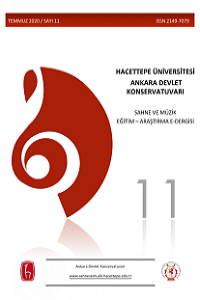Öz
In this study, the opinions of learning, social learning and leading theorists on this subject and predictions to increase the quality of conservatory instrument lessons in the light of these opinions are included. The article contains the findings of my thesis I completed in 2019 on these predictions. The findings in the research are supported by the question-and-answer method made with expert opinions and the conservatory secondary school circuit is limited to the instrument lessons of the flute students.
Conservatory instrument learning process is determined as 4 years secondary school, 4 years high school, 4 years university, and it is framed by a specific curriculum suitable for the age group of each class. Students are trained in the discipline, dedication, and careful communication with their peers and other age groups they will work together in collective lessons. They learn not only from their teachers but also from each other at school because the common language they speak regardless of age group is music. They have the opportunity to observe the courses they have taken for vocational education in the courses and rehearsals of other students. The fact that there are role models for the younger students that they can observe, apart from their teachers, may enable them to follow the process of their education more consciously. One of the most obvious examples of this is instrument lessons. Educators providing instrument education have students in different classes from secondary school to undergraduate. Students' observation of other lessons besides their own lessons may affect their learning speed. Although there is no direct research on the students of the conservatory in this regard, the studies of the psychotherapist and theorist Albert Bandura, who proved that it is possible to learn from the environment with social learning theory, will shed light on this article.
Anahtar Kelimeler
Kaynakça
- Bandura, Albert. (1971) Social Learning Theory. New York City: General Learning Press.
- Çakır, Mehmet Ali. (2011). Sosyal Bilişsel Öğrenme Kuramı. Alim Kaya (Ed.). Eğitim Psikolojisi (341-354). Ankara: Pegem Akademi.
- Glesne,Corrine. (2012). Nitel Araştırmaya Giriş. Ali Ersoy, Pelin Yalçınoğlu (Çeviri Ed.) Ankara: Anı Yayıncılık.
- Selçuk, Ziya. (2018). Eğitim Psikolojisi. Ankara: Nobel Akademik Yayıncılık.
- Senemoğlu, Nuray. (2013). Gelişim, Öğrenme ve Öğretim Kuramdan Uygulamaya. Ankara: Yargı Yayınevi.
- Yıldırım, Ali., Şimşek, Hasan. (2018). Sosyal Bilimlerde Nitel Araştırma Yöntemleri. Ankara: Seçkin Yayıncılık
- https://www.academia.edu/11773431. Erişim: 17.09.2019
- Zimmermann, Barry J. (1989). A Social Cognitive View of Self-Regulated Academic Learning. Article in Jornal of Educational Psychology, September,s.2.
- Erişim : 12/05/2020 file:///C:/Users/Admin/Downloads/A_Social_Cognitive_View_of_Self- Regulated_Academic.pdf
Öz
Bu çalışmada öğrenme, sosyal öğrenme ve bu konuda önde gelen kuramcıların görüşleri ile bu görüşler ışığında konservatuvar çalgı derslerinin niteliğini artırmaya yönelik öngörüler yer almaktadır. Makalede bu öngörüler üzerine 2019’da tamamlamış olduğum tezimin bulguları bulunmaktadır. Araştırmada yer alan bulgular, uzman görüşleri ile yapılan soru cevap yöntemi ile desteklenmekte ve konservatuvar ortaokul devresi flüt öğrencilerinin çalgı dersleri ile sınırlandırılmaktadır.
Konservatuvar çalgı öğrenme süreci 4 yıl ortaokul, 4 yıl lise, 4 yıl üniversite olarak belirlenmiş, her sınıfın yaş grubuna uygun belirli bir müfredat ile çerçevelenmiştir. Öğrenciler ilk çalgı dersinden itibaren mesleklerinin gerektirdiği disiplin, özveri, yaşıtlarıyla ve toplu derslerde birlikte çalışacakları diğer yaş gruplarıyla dikkatli iletişim konusunda eğitilirler. Okulda sadece öğretmenlerinden değil birbirlerinden de öğrenirler çünkü yaş grubu fark etmeksizin konuştukları ortak dil, müziktir. Meslek eğitimine yönelik aldıkları dersleri başka öğrencilerin derslerinde, provalarda gözlemleme şansına sahip olurlar. Yaşça daha küçük olan öğrenciler için öğretmenlerinin dışında gözlemleyebilecekleri rol modellerinin olması, aldıkları eğitimin sürecini daha bilinçli takip etmelerini sağlayabilir. Bunun en bariz örneklerinden biri de çalgı dersleridir. Çalgı eğitimi veren eğitimcilerin ortaokuldan lisansa kadar farklı sınıflarda öğrencileri bulunur. Öğrencilerin kendi dersleri dışında diğer dersleri de gözlemlemesi öğrenme hızlarına etki edebilir. Bu konuda konservatuvar öğrencileri üzerinde direkt bir araştırma yapılmamış olsa da, sosyal öğrenme kuramı ile çevreden öğrenmenin mümkün olduğunu ispatlayan psikoterapist ve kuramcı Albert Bandura’nın çalışmaları bu makaleye ışık olacaktır.
Anahtar Kelimeler
Kaynakça
- Bandura, Albert. (1971) Social Learning Theory. New York City: General Learning Press.
- Çakır, Mehmet Ali. (2011). Sosyal Bilişsel Öğrenme Kuramı. Alim Kaya (Ed.). Eğitim Psikolojisi (341-354). Ankara: Pegem Akademi.
- Glesne,Corrine. (2012). Nitel Araştırmaya Giriş. Ali Ersoy, Pelin Yalçınoğlu (Çeviri Ed.) Ankara: Anı Yayıncılık.
- Selçuk, Ziya. (2018). Eğitim Psikolojisi. Ankara: Nobel Akademik Yayıncılık.
- Senemoğlu, Nuray. (2013). Gelişim, Öğrenme ve Öğretim Kuramdan Uygulamaya. Ankara: Yargı Yayınevi.
- Yıldırım, Ali., Şimşek, Hasan. (2018). Sosyal Bilimlerde Nitel Araştırma Yöntemleri. Ankara: Seçkin Yayıncılık
- https://www.academia.edu/11773431. Erişim: 17.09.2019
- Zimmermann, Barry J. (1989). A Social Cognitive View of Self-Regulated Academic Learning. Article in Jornal of Educational Psychology, September,s.2.
- Erişim : 12/05/2020 file:///C:/Users/Admin/Downloads/A_Social_Cognitive_View_of_Self- Regulated_Academic.pdf
Ayrıntılar
| Birincil Dil | Türkçe |
|---|---|
| Bölüm | Makaleler |
| Yazarlar | |
| Yayımlanma Tarihi | 20 Temmuz 2020 |
| Yayımlandığı Sayı | Yıl 2020 Sayı: 11 |


